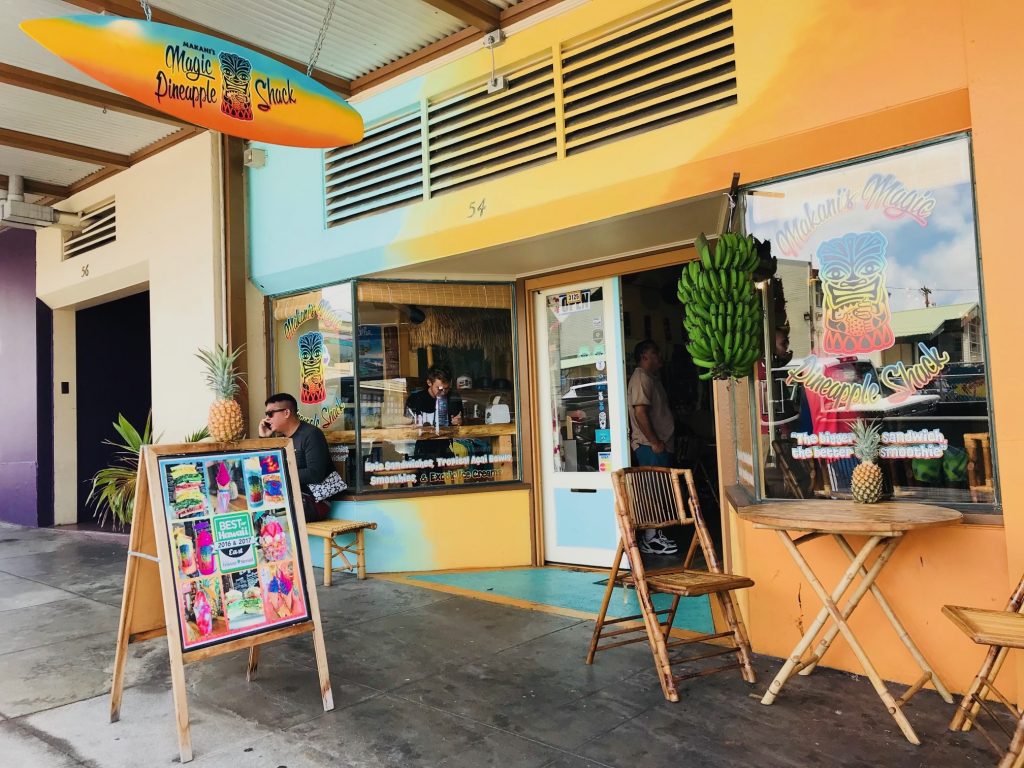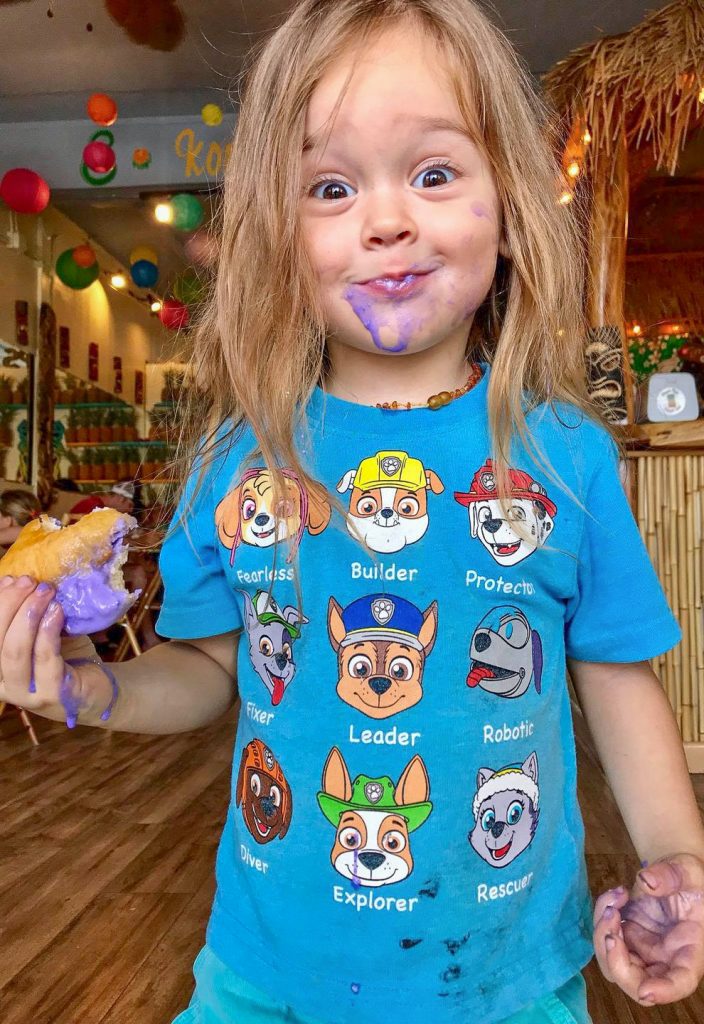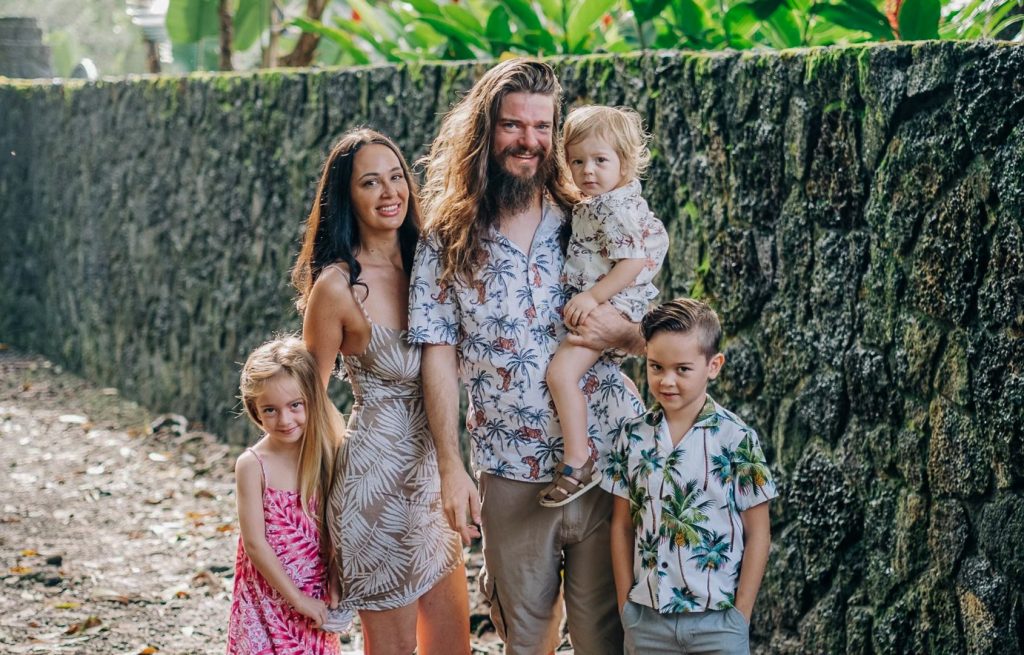Business Monday: Hilo business’ Aloha Açaí Bowl makes America’s 50 best over-the-top treats

Hilo business owners Lokelani and Cämu Wetzel were excited to see one of their tasty creations — the Aloha Açaí Bowl — featured in the latest Food Network magazine as Hawaiʻi’s winner in its America’s 50 best over-the-top treats.
It ranked side-by-side with Connecticut’s nutella s’mores french toast tower, Colorado’s glow-in-the-dark cotton candy, Arkansas’ fried pie and the other state winners.
For years, the Aloha Açaí Bowl has been a fan favorite of the Wetzel’s business, Makani’s Magic Pineapple Shack. The smooth, deep-purple blend of açaí is topped with pineapple, bananas, strawberries, homemade granola and a drink umbrella, all arranged in a half pineapple.
“Rather than being slapped together, I thought: ‘How pretty can we make this thing?'” said Lokelani Wetzel.

Watching customers, phone-in-hand, take photos of the Aloha Açaí bowl before devouring it is a highlight for the business owners.
“I don’t know if we’re the best in the nation, but it’s definitely the best açaí bowl in Hawai‘i,” Lokelani Wetzel said.
While the smoothies and açaí bowls are beautiful and delicious, at the heart of the Hilo business is a couple who took a chance on an idea and started a business and family in the process.
It was 2014. The Wetzels were living in New York City and had just had their first child, Makani. Lokelani Wetzel, born and raised in Puna, got the idea to start a business while attending the online school, Institute of Integrative Nutrition.
“I love eating healthy and using fresh ingredients and thought it would be awesome to open something in Hawai‘i,” she said. “I wanted to either do smoothies and açaí, cupcakes or boba.”
Cämu Wetzel said he and his wife had no idea what they were getting into when they decided to pursue entrepreneurship.
“But that was part of the charm,” he said.
The couple’s business plan started with Cämu Wentzel’s sketch of a shop with a tiki hut and island vibe. Lokelani had the vision for the bowls and other menu items.
While visiting family, Cämu Wetzel secured a loan for the business in his native Finland and picked up investors.
It was a leap of faith. They relocated to the Big Island in 2015 after spending the winter in Finland to make their vision a reality.
The couple found their shop at 54 Waiānuenue Ave. in old town Hilo. After nine months of acquiring various permits and equipment, they opened their doors in 2016, originally naming it the Big Island Juice Co. They featured blended juices and açaí, pronounced ah-sigh-EE, which comes from the açaí berry grown on the açaí palm tree in South American rainforests.

“At the end of the day, it’s about believing in yourself,” Cämu Wetzel said.
During those first couple of years, the Wetzels ironed out what customers wanted, resulting in the shop focusing on smoothies and açaí bowls. They also perfected the art of how they made the bowl, transitioning from a blender to soft-serve machine, which gives the açaí a frozen yogurt consistency.
“That has given us the longevity,” Cämu Wetzel said. “It’s a work of art.”
The shop also carries soft-serve flavors in dragon fruit and ube, or purple potato. A regular size açaí bowl is $14. A large bowl, easily shared between two people, is $19.
A year after opening, they changed the shop’s name to Makani’s Magic Pineapple Shack after their first son, who is now 9 years old.
“His favorite treat is açaí with peanut butter, but he also likes to add popping boba,” Lokelani Wetzel said.
A favorite creation for herself and many of her loyal local customers is Cookie Monster, which is made with cookie dough and homemade granola. Its açaí includes cookie butter and Nutella.
The tiki hut shop, wedged between businesses along Waianunue Avenue, has a large menu on the wall and pictures of the family as it has grown over the years. Makani now has siblings: 5-year-old Kiani and 2-year-old Journey.
The Wetzels have had offers to open a spot on O‘ahu and considered opening a second location in Kona. But they ultimately decided to stick to just the Hilo shop for the time being.
Part of the reason for not expanding to O‘ahu, Cämu Wetzel said, is the cost for rental space. It is more favorable on the Big Island. And, he said, Hawai‘i County gives people a chance to succeed.
Sponsored Content
Comments













_1770333123096.webp)


